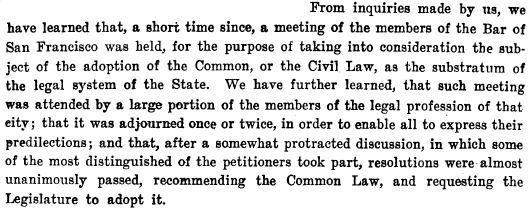
Common law is, very simply, what is “right” outside of any sort of government rules, or other so called authorities. It places the ordinary person and their reasoning as the authority. It is the natural, simple reasoning of what our rights are and what remedy is proper when those rights are violated. Reason is the living law — the common law.
Civil law is different than common law. Civil law is law which is written down and has its roots in the Roman Empire and in many texts is referred to as Roman law, or statutory law, or laws which are written and interpreted by judges. Also, when you are functioning at civil law, you are functioning as a “citizen,” like a Roman citizen, who is subject to the stern inflexibility of such statutes and the arbitrary judgments of judges concerning such written law. The weakness of this system of law is its great inflexibility and the abitrary decisions of magistrates — and the need for it to try to cover every circumstance possible. As common law is less used today, many presently have resorted to try to get civil laws passed to do just that, to cover every circumstance possible.
For a metaphorical comparison though, civil law is like an ever expanding machine of control, of which no one can know every part. Common law is like a living, breathing tool, connected to the universe itself, and especially connected to your own internal knowledge of right and wrong, such that this law can alter its form, bend and evolve to suit literally any situation at hand. Literally, it is the living law, morality itself alive and in practice.
A reading of the RCCL reveals that at that time, that there were a few attorneys who very much desired for the establishment of civil law in California as possibly a great bolsterment to their profession; they wished for common law to be abolished in California and civil law to be exclusively adopted. From this report though, it is clear that most attorneys at the time understood how foundational the common law was in California and in the United States generally and the report concludes with the strong advocation that the legislature ensure that Common Law stays as the law in California. The document also goes into some good detail concerning how common law is truly the foundation upon which the United States was founded and of its superiority to civil law.
According to common law (RCCL, p.588-9):

Concerning San Francisco lawyers, this report said (589-90):

Concerning the common law’s validity and its fundamental permeation in the U.S. Constitution, this report says much (591):

The report goes on to speak of how common law has influenced civil law (592):

The report goes on to explain that the common law has been grounded as the birthright of freedom which every immigrant settler has taken with them out of England into their new land (593):

The report makes several comparisons between common and civil law explaining some of it metaphorically to the aide of the reader (597):

The report also speaks of how in civil law, not only are all the laws written down, but such a fact thus leaves the people powerless and uneducated concerning the finely written details of the law, requiring them to consult specialist attorneys at nearly very turn in their interactions with others (602):


This may also be a good time to explain that many of these texts to be quoted herein refer to the common law in the past tense, and explain in gross detail the common law and how suits proceeded according to it as it was done at the revolution — when the colonies broke from England. Black gives some additional insights about this in his definitions (Black, 345-6):

Sometimes those studying and writing about the common law go even so far as to explain how proceedings were done at the time of William the Conqueror, before even the Magna Carta (one of the seminal documents which helped ground the common law as the law of England). They go back and refer to it in the past tense, because the common law is about the evolution of how people thought about right and wrong. As we will later see, especially in the forms of common law actions, it is still alive and adapting to new situations, but its foundation is ancient and a knowledge of the law is based on principles of personal sovereignty and moral reasoning, not inert inflexible codes interpreted by judges.
Also, in numerous contemporary civil cases, while referring to common law in the past tense, the common law is repeatedly verified as still being quite valid today when it is evoked in a civil court setting.
All of this speaking in the past tense, is also very much done so as to instruct the reader on what the essence of the living law is: That history of what authority was, how reason was informed by it, and how injustice was presented to the world, thus informing the reasoning and presentation of today — not as a set of unbending rules, but by the understanding of truly what reasoning is and how it came about; not by verbal form so stiff it strangles every suit, but by the establishment of facts.
The history is to understand the principle that good form is a result of good substance — that “form” itself drives not, nor enforces the common law, but facts and reason.